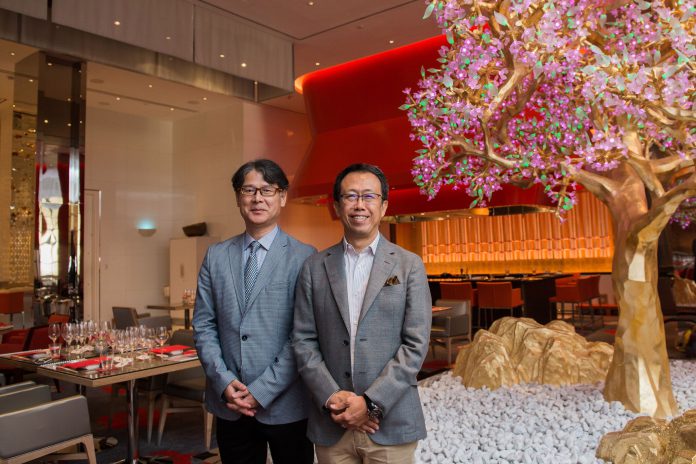Sake, or Japanese rice wine, has been popular in Japan for over two thousand years. Even with its long history in the Land of the Rising Sun, not many people are familiar with this wine outside Japan. Michelin-starred Japanese fine dining restaurant Mizumi at Wynn Palace introduces high-end sake maestros Matsunotsukasa to Macau.
 Matusunotskasa literally means the great pine tree. Founded in 1860 in a small city, Shiga in the centre of Japan, the city is famous for Lake Biwa, the country’s largest lake. For over a hundred years, Matusunotskasa still insists in engaging with a purity of spirit, respecting nature and deepening its understanding of Japanese culture.
Matusunotskasa literally means the great pine tree. Founded in 1860 in a small city, Shiga in the centre of Japan, the city is famous for Lake Biwa, the country’s largest lake. For over a hundred years, Matusunotskasa still insists in engaging with a purity of spirit, respecting nature and deepening its understanding of Japanese culture.
 Different from the rice wine of other countries, brewing sake requires more intricate steps for its smoother texture and magnificent flavour. The source of water, rice and yeast have a bearing on the quality of sake, simple things that make Matsunotsukasa outstanding. Brewing at Matsunotsukasa starts with carefully selected local ingredients, including sake-specific rice grown nearby and water drawn from 120 metres underground. The brewing water they use comes from the underflow of the Echigawa River, which rises in the Suzuka Mountain range. The water there – hard and full of minerals – greatly helps the fermentation of yeast.
Different from the rice wine of other countries, brewing sake requires more intricate steps for its smoother texture and magnificent flavour. The source of water, rice and yeast have a bearing on the quality of sake, simple things that make Matsunotsukasa outstanding. Brewing at Matsunotsukasa starts with carefully selected local ingredients, including sake-specific rice grown nearby and water drawn from 120 metres underground. The brewing water they use comes from the underflow of the Echigawa River, which rises in the Suzuka Mountain range. The water there – hard and full of minerals – greatly helps the fermentation of yeast.
Rice is especially critical for brewing quality sake. In 1988, Matunotsukasa started to use rice grown locally in the village of Ryuou or from the old Tojo area of Hyogo Prefecture. Strongly respecting nature, the brand has dared to adopt organic rice-fielding. This is very rare in Japan because typhoons destroy many fields every year.
 “There is a beautiful lake near our factory. This prefecture is very strict. I started to think of protecting the beautiful nature and adopt organic rice-fielding,” says Tadayuki Masuse, the Managing Director of Matunotsukasa. Apart from typhoons, climate warming is threatening organic rice-fielding.
“There is a beautiful lake near our factory. This prefecture is very strict. I started to think of protecting the beautiful nature and adopt organic rice-fielding,” says Tadayuki Masuse, the Managing Director of Matunotsukasa. Apart from typhoons, climate warming is threatening organic rice-fielding.
“I travelled to France and found a very interesting way to fight climate warming,” he says. “It is a little bit strange. We use a very thin organic paper to cover all the rice fields. This way was established thirty years ago. This thin paper can protect the rice from the sunshine. This paper can be dissolved into water.”
Matunotsukasa also considers the sustainability of his fields, starting a new style of cultivation leaving fields untilled and flooded throughout Winter, avoiding agricultural chemicals and synthetic fertilisers. This cultivation approach keeps the fields flooded once the rice is harvested, which has been found to encourage the growth of micro-organisms and restore the original natural ecosystem through the action of the food chain: “Here, you will find frogs and even turtles in the organic fields,” says Master of Wine Kennichi Ohashi.
 After harvesting, all the rice is sent for painstaking milling by brewery staff. The flavour of sake is influenced by koji, cooked rice inoculated with the fermentation culture aspergillus oryzae. Matunotsukasa produces the koji-inoculated rice by the box method and brews it with the brand’s unique yeast cultures using sokujo or kimoto starters as appropriate to the style of sake.
After harvesting, all the rice is sent for painstaking milling by brewery staff. The flavour of sake is influenced by koji, cooked rice inoculated with the fermentation culture aspergillus oryzae. Matunotsukasa produces the koji-inoculated rice by the box method and brews it with the brand’s unique yeast cultures using sokujo or kimoto starters as appropriate to the style of sake.
To ensure the success of the complete fermentation, staff brew the main ferment in small batches at a very low temperature and store bottled sake on site at 5℃ or lower
Now, at Wynn Palace, guests can enjoy all the signature products of Matsunotsukasa; namely, Matsunotsukasa Daijinjo Junmai Kuro, Matsunotsukasa Junmai Ginjo Raku, Matsunotsukasa Kimoto Junmai, Matsunotsukasa Junmai Ginjo Azolla and Matsunotsukasa Junmai Ginjo Ryuou Yamadanishiki.
Matsunotsukasa Junmai Ginjo Ryuou Yamadanishiki is considered the brand’s signature product. Made with the finest Yamadanishiki grown each year by contract farmers in Ryuou, its fresh aroma accompanies a palate that melds juicy fruit flavours, rounded umami and transparency comparable to a fine white wine. “The best temperature to drink Junmai Ginjo Ryuou Yamadanishiki is 10-15℃.” says Mr. Masuse. To pair with this premium sake, mild food is advised, adding: “Matsunotsukasa sake is very delicate. It’s perfect to pair with high quality fish filet which is only the texture. And crunchy vegetable tempura with a little bit of seasoning is also very good.”
























